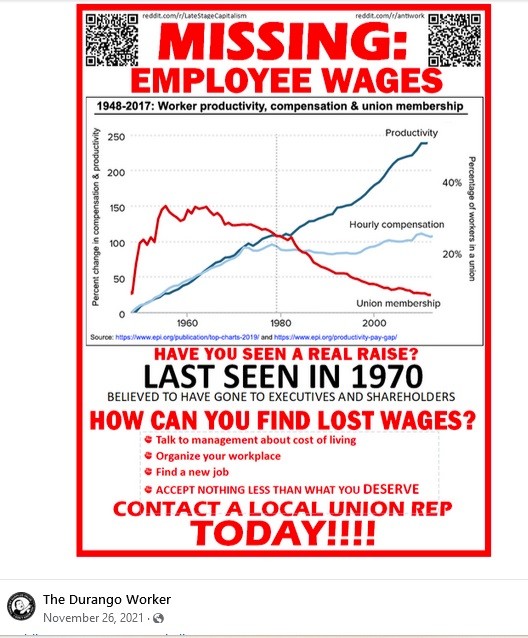I think the decline in union membership is a symptom more than a cause. The late seventies, early eighties is where we saw industrial automation start to really take off. As actual skilled labour got handed over to automated processes, unions lost power (the political union busting also played a huge part), since their members biggest chip was the difficulty in replacing them if they all leave.
Late Stage Capitalism
A place for for news, discussion, memes, and links criticizing capitalism and advancing viewpoints that challenge liberal capitalist ideology. That means any support for any liberal capitalist political party (like the Democrats) is strictly prohibited.
A zero-tolerance policy for bigotry of any kind. Failure to respect this will result in a ban.
RULES:
1 Understand the left starts at anti-capitalism.
2 No Trolling
3 No capitalist apologia, anti-socialism, or liberalism, liberalism is in direct conflict with the left. Support for capitalism or for the parties or ideologies that uphold it are not welcome or tolerated.
4 No imperialism, conservatism, reactionism or Zionism, lessor evil rhetoric. Dismissing 3rd party votes or 'wasted votes on 3rd party' is lessor evil rhetoric.
5 No bigotry, no racism, sexism, antisemitism, homophobia, transphobia, ableism, or any type of prejudice.
6 Be civil in comments and no accusations of being a bot, 'paid by Putin,' Tankie, etc.
The decline in union membership was very much due to an intentional attack by Reagan and the Republicans. Until Reagan, the National Labor Relations Board had been composed of mostly career government lawyers. They were replaced with people who had spent their careers representing management. They aggressively reversed precedents and narrowed workers rights.
https://onlabor.org/ronald-reagan-has-shaped-u-s-labor-law-for-decades/
Reagan accelerated what was already coming. Automation completely changes the balance of power in labour negotiations. Previously, unions had power because skilled labour is very expensive and time consuming to replace. If you automate the "skilled" portion of that equation, companies immediately become much more willing to simply shut a plant and move production elsewhere.
US Steel was one of the largest union employers and helped cause this current anti-union trend because it was run by lazy, stupid executives that didn't think they needed to adopt new technology or improve yields, quality, and profitability.
They died because the Japanese steel imports were better quality and cheaper, owing to their use of new technology as part of their MITI (Ministry of International Trade and Industry) investments during the 70s and 80s. It's also why Japan took off in technology and became the economic powerhouse it is today - that started because their government forced companies to invest in new technology and processes.
Western companies grow complacent with their approach to business and getting conservatives to lead companies, rejecting new ideas or outside influences as "not for us". Laziness and willful ignorance killed the businesses that used unions. Unions need to force change from within if they want to become and stay relevant.
Interesting thoughts. Sounds like exactly what happened to American auto manufacturing. We thought we were the best ever, got lazy, got our asses kicked by Japan.
I blame the union membership shying away from lower the hours of the work week and expanding their membership with bookoo overtime.
Unions are primarily hourly employees. Lower hours will always be met with resistance, since it will result in less overall pay.
And that was the problem. The contracts should have been for higher pay and less hours till overtime kicked in with the goal of the reduced full time allowing for a comfortable living and getting two shifts a week. So like a 30 hour week would allow for two daytime shifts of 10 hours over 3 days allowing for an extended day and week of productivity company wise while expanding the worker base.
Unions won't vote for that either, because additional employees cost more money. The company is only going to have a fixed total number they can afford to pay out for labour. Only about half that is the actual wage the employee receives. So if you want to have more employees working less hours each, you are going to have to take a pay cut, which again, no unions are going to go for. And for that matter, the company usually won't go for that either. They want less employees, and not just to save on labour costs.
yeah I know they did not go for that but they should have. they were instrumental in the 40 hour week and they should not have stopped there.
Please add CEO wage and shareholder dividends to clarify the point
That's a disappointing website. It's just a lot of graphs showing that something happened in 1971 but just leaves us hanging without giving an answer.
Well the address is a question. Whatever happened was behind doors
Maybe, but it couldn't happen without visible policy and legal changes.
